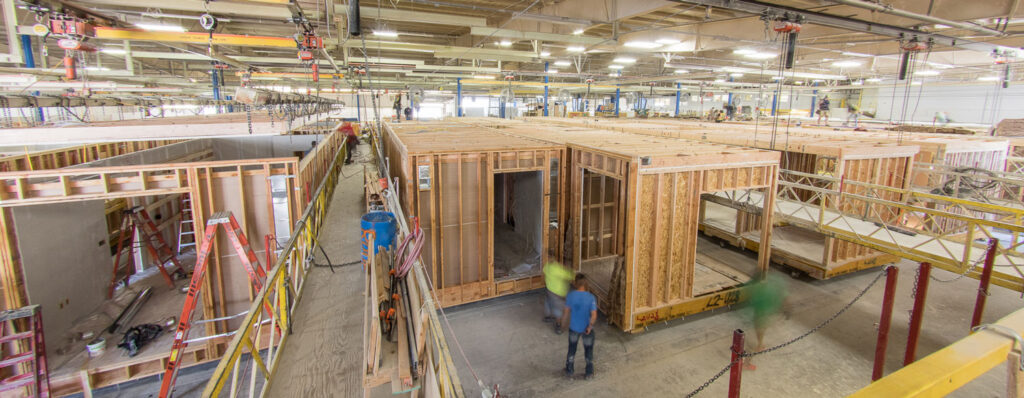Walk into any modular home factory and you’ll hear the rhythmic buzz of saws, the clang of steel jigs, the occasional grumble about inspectors, and someone yelling that the bathroom pods are one unit behind. It’s a symphony of productivity, coordination, and mild chaos. But buried in all that noise is a truth that most folks overlook: every modular home factory is, at its core, a component manufacturer. But before the guys over at the roof truss plant put down their coffee and declare victory, let me finish—not every component manufacturer is cut out to be a modular factory.
Let’s unpack that, one stud at a time.
Modular Factories—The Overachievers of the Component World
Modular factories don’t just manufacture one type of component. They manufacture all of them—and then marry them together into something that looks suspiciously like a home.

photo – Guerdon Modular
Wall panels? Check.
Floor decks? Yep.
Roof assemblies? Absolutely.
Fully functioning kitchens with quartz countertops and a dishwasher already installed? Only if you’re fancy.
Think of a modular factory as the overachiever in a high school shop class. While the component factory is proudly making the same cabinet 400 times a day (and doing it well), the modular factory is over there building the cabinet, installing it, and making sure the plumbing for the sink above it works and passes inspection in three different states.
Every modular factory must first become a component manufacturer—producing structural panels, floors, roofs, doors, and windows on repeat. It’s like being a jack of all trades and then being asked to assemble the whole deck of cards, perfectly, under budget, and in three days.
Component Plants—Masters of the Slice, Not the Whole Pie
Now, your average component manufacturer—say, someone building trusses or panelized walls—is like the dependable baker who turns out perfect pie crusts every day. But when asked to serve an entire Thanksgiving dinner, they look at you like you’ve grown a third arm.

Photo – Winton Homes
Why? Because making components is only part of the battle.
Component plants rarely deal with the full burden of coordination, code compliance, MEP integration (Mechanical, Electrical, and Plumbing), or the unforgiving logistics of getting a 14-foot-wide house module down a back road with two inches to spare. They don’t have to worry about insulation getting wet in transit, or if the drywall survived a 300-mile trek without cracking like a Ritz cracker under a boot.
Most component manufacturers also don’t typically touch finish work. Paint? Tile? Light fixtures? That’s sorcery as far as they’re concerned.
They are brilliant at making consistent, reliable pieces, but they usually don’t have the project management insanity of aligning 17 components, 6 trades, 3 inspections, and a set crew all on the same Thursday at 9:00 AM.
Why It Matters—And Why It’s Funny
This truth—that modular factories are component manufacturers but the reverse isn’t true—is both a source of pride and mild annoyance for those in the modular world.
It’s like a gourmet chef being told by a short-order cook, “We both use frying pans, so we’re basically the same.” No, Steve. No, we are not.
Modular factories live in a world of tight tolerances, tighter deadlines, and a constant fear of last-minute code changes. They build a home in slices and then pray it fits together like IKEA furniture when it gets to the jobsite. Component plants, meanwhile, get to focus on what they do best—making a single piece of the puzzle with perfect precision.
Both are essential. Both are impressive. But only one is putting all the puzzle pieces together under a roof before the storm hits.
It’s Okay to Be a Slice
So yes, every modular factory is a component manufacturer. It has to be. But not every component manufacturer can—or should—try to be a modular factory. The stress alone would turn most plant managers into drywall dust.
Instead, let’s celebrate the difference. Modular factories are the multitasking magicians of offsite construction. Component manufacturers are the dependable craftsmen who make sure the magician’s act doesn’t fall apart mid-performance.
And together, they’re building the future of housing. One slice—and one whole pie—at a time.
.
Gary Fleisher, The Modcoach, writes about the modular and offsite construction industry at Modular Home Source.
.
CLICK HERE to read the latest edition
Contact Gary Fleisher












